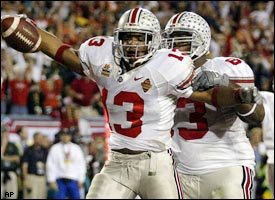MAURICE CLARETT: SOCIAL CAPITAL AND CAUTIONARY TALES

It is impossible to know what was going on in Maurice Clarett's mind the night he flashed a gun and demanded property from a couple on New Year's day 2006. It is also impossible to know what was going on in his head the night of August 9, 2006, when he was arrested and police found guns and a half-empty bottle of vodka in his vehicle. However, it is very easy to speculate what was going on in his mind -- a quick glance in the sports sections of the major newspapers over the last few weeks confirms this. What is certain though, is that Maurice Clarett had all the talent and ability to have a successful career in the NFL, but his lack of social capital, and/or his desire to tap into the little available to him, ultimately cost him his career, and potentially, significant portions of his life.
On January 3, 2003, Maurice Clarett joined some rare company: Magic Johnson, Grant Hill, and Isiah Thomas. The act that allowed his name to be said along with these greats? His five-yard run for a touchdown in the second overtime delivered a national championship to Ohio State. And with that, he became of of those few who, at a very young age, led their team to a nation championship.
However, who would have thought that this celebratory evening would have been the last highlight of his young life?
Maurice Clarett was pure football skill. Coming out of Warren Harding High School, he was dubbed by many journalists as the top high-school football player in the country. His speed was virtually unmatched, and his ability to read and react to play's was compared to veteran collegiate players.
He shined in his first year with the Buckeye's, rushing for 1,237 yards (a school record for freshmen) and scoring 18 touchdowns. The Buckeye's finished with a perfect 14-0 record, and went on to win the aforementioned national championship on his winning touchdown.
However, unlike another Ohio teenage phenom, Maurice Clarett did not have the social capital, at a young age, necessary to develop the skills, knowledge, and contacts, necessary to maintain a level head and be successful.
The idea behind social capital is that inherent in each individual's social networks is the knowledge, resources, and contacts that are invaluable for pursuing and achieving goals. For instance, because person A knows person B, and person B knows person C, person A can tap into the knowledge and resources person C possess, due to their relationship with person B. It is somewhat more complex than this, and has much to do with trust and reciprocity, but this is the basic point.
In any event, social capital is crucial for an individuals continued development and success. And compared to other athletes, Clarett just didn't have it at an early age. Clarett came from an impoverished background, traditionally low on social capital, and he had very little support from his family. In fact, he had the burden of being the "one," the individual on whom the family's hopes and dreams were pinned.
However, other athletes from poor backgrounds have gone on to have successful and healthy careers. The question remains, why did Clarett not succeed. And in this instance, the blame falls squarely on him. Whereas other athletes with little social capital tapped into what bit they had, Clarett refused to do this.
Clarett (like other athletes) was given ample opportunity to develop new social capital in the context and structure of the football environment. Here, he had coaches who wanted to help him succeed and friends and teammates upon whom he could rely. Yet still, he didn't take to this. On the contrary, he walked around like the world owed him something. Consider this comment from Mike Shanahan, Denver Bronco's coach:
He's got some heavy issues. It's just a shame this has happened to a guy that [had] so much promise and so much ability. I'm not sure what happened to him but it's a real shame...We tried to reach him quite a bit when he was here. One thing he did have here was a lot of support from our veterans and our players tried to really take care of this guy and he wanted no part of it...

So, whereas other players with similar backgrounds were able, and willing, to tap into the networks that became available to them, and to use them to their advantage, Clarett shunned these opportunities.
So when someone like Michael Wilbon refers to Clarett as a "cautionary tale," it isn't simply that Clarett had too much pressure placed upon him too quickly, it is also that young athletes must embrace and tap into the resources available to them through the networks and relationships around them. It is also about the importance coach's and team officials have in the dynamic. They are more than 'coaches' and 'officials,' they are leaders, mentors, guides, and contacts for these athletes that may have nothing else.

0 Comments:
Post a Comment
<< Home